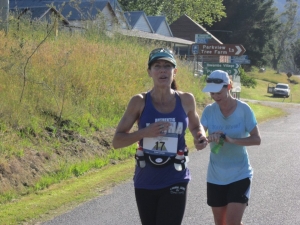In it for the long run
Research news
Lisa Lucas, PhD candidate and ultra-marathon runner, pauses for a moment and then agrees.
“Yeah there is quite a cross over between the two,” she says, more than a little ruefully because she is nursing angry blisters and complaining muscles after running the 240 kilometre Coast to Kosci race, a lot of it up the very steep incline of Australia’s highest mountain, – and all in less than 40 hours.
“One of my favourite sayings is ‘ability is what you are capable of doing, motivation determines what you do and attitude determines how well you do it.
“When you run 240 kilometres, you need a lot of mental strength to keep going when your body is telling you to stop. It’s 80 per cent mental.
“I love to run and I love to push myself mentally and physically and ultra running certainly ticks those boxes,
“When you’re doing your PhD, you also need to be able to push yourself.
“There are various times when you have to dig deep, find the motivation and the attitude and convince yourself that like the view when you get to the top of Mt Kosciuszko it is going to be worth it.”
Motivation and attitude weren’t the only things linking Lisa’s passion for running and her University during the Coast to Kosciuszko race in December.
Her support crew included not only her husband Richard but three of her colleagues from the Deakin’s Centre for Physical Activity and Nutrition Research (CPAN) - Lisa Newman, Rivkeh Haryono and Karen Lim.
“Lisa, Rivkeh, and Karen all volunteered to help Richard,” Lisa said.
“All four of them wore T shirts with a picture of me super-imposed on the Road Runner on them.
“They went above and beyond the call of duty, they had to feed me, and they had to pop my blisters.”
Without too many blisters so far, Lisa is about half way up her research mountain as she looks to see what influence extra virgin olive oil – and one of its prime constituents, oleocanthal – can have on muscle regeneration processes and comparing that to the non-steroid anti-inflammatory drug ibuprofen.
Another primary aim is to determine if oleocanthal has different levels of anti-inflammatory actions in those sensitive or insensitive to the oral irritation caused by the compound.
Oleocanthal possesses similar anti-inflammatory and perceptual properties to the drug ibuprofen and the few studies conducted so far have verified its anti-inflammatory and potential therapeutic actions.
“I got interested in this work because when I was doing my honours, I was working alongside Sara Cicerale and she was looking at the perceptual properties as well as the stability of oleocanthal during heating and shelf life,” Lisa said.
“I went to her presentations and read her papers and I found it all very interesting.
“I also like the fact that it combines the sensory and the molecular.”
Oleocanthal is responsible for the slightly peppery "bite" of extra virgin olive oil and has been found to have anti-inflammatory and anti-oxidant properties.
“Popular methods to deal with inflammation and its associated symptoms involve the use of non steroidal anti-inflammatory drugs, however the use of these drugs is associated with severe side effects,” Lisa said.
“Therefore, investigations concerned with natural methods of inflammatory control are warranted.
“A traditional Mediterranean diet, with its high virgin olive oil content, has been shown to provide some protection against the pathology of chronic diseases through the attenuation of inflammation.”
Lisa is about to begin a critical third stage of her PhD.
“I will be recruiting people very sensitive to the oral irritation and another group who are not sensitive to the peppery sensation of oleocanthal,” she said.
“I will be taking muscle from them and seeing if oleocanthal has different levels of anti-inflammatory impact in the two groups.
“We know that there is a specific sensory receptor for oleocanthal and ibuprofen so I will also be looking to see if reception levels different among sensitive and insensitive individuals.
“The results might have implications for future endeavours to find suitable natural alternative synthetic anti-inflammatories.
“Or it might be the case that long term intake of virgin olive oil may have the similar impact of reducing inflammation, which is now achieved with the non-steroidal anti-inflammatory drugs, but without the side-effects."
Which means that more than Lisa Lucas will be hoping that, like that panoramic view from the top of Mt Kosciuszko, the hard slog of her PhD will be worth it in the long run.
Share this story
 Ability is what you are capable of doing, motivation determines what you do and attitude determines how well you do it, says Deakin PhD candidate and ultra-marathon runner Lisa Lucas.
Ability is what you are capable of doing, motivation determines what you do and attitude determines how well you do it, says Deakin PhD candidate and ultra-marathon runner Lisa Lucas.
